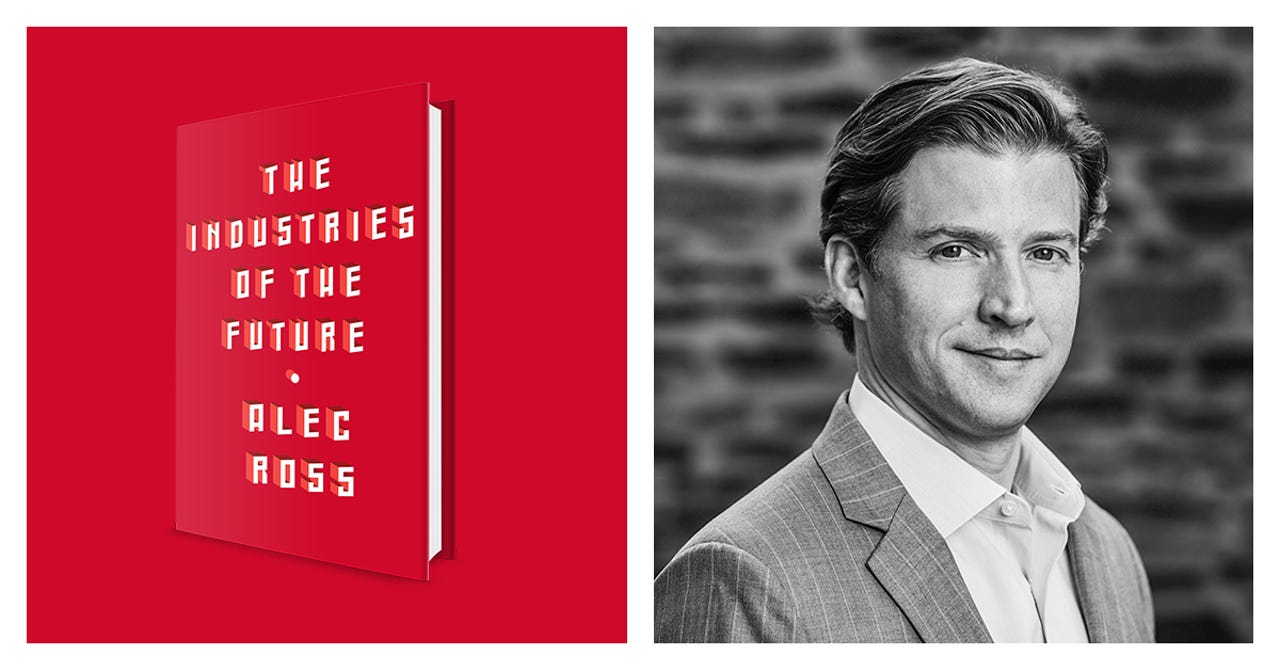How to guide your kids toward success in tomorrow's innovation economy


Alec Ross is an innovation expert. That's an extraordinarily ridiculous title to go throwing around, and the sort of LinkedIn era self-branding you've probably learned to tune out by now. But in this case it's true.
Robotics
Ross is the former Senior Advisor for Innovation to Secretary of State Hillary Clinton and is currently a Distinguished Visiting Fellow at Johns Hopkins University. He just came out with a new book about innovation and the workforce, The Industries of the Future, and it's worth your time. In an age when prognosticating about the future of work typically means choosing between utopian fantasies and doomsday calamity, Ross's book comes off as level-headed, deeply considered, and genuinely illuminating.
Last month I got Ross on the phone and he shared three tips for tech workers looking to transition into high-growth sectors. In the intervening weeks I became a father for the first time. With babies on the brain, I decided to connect with Ross again to get some tips for parents on how to help kids wanting to pursue a career in tech in the 21st century. (I'm pretty sure that's the direction my three-week-old is leaning.)
GREG:Okay, preposterously broad question: If you had to give parents one overarching piece of advice to prepare their kids for a future in tech, what would it be?
ALEC:Teach your children about the world. Really, that's what it's about. From political science to earth science, encourage them to learn about different ends of the knowledge spectrum and cultures from all over the globe. Because it isn't just about STEM anymore. To compete tomorrow, students and job seekers will need a firm grasp on communication and creativity.
GREG: Interesting that you advocate a more ecumenical, holistic approach to education, because it's counter to this trend of hyper-specialization from a young age. What's the risk of siloing kids in one area, like computer science?
ALEC: Tomorrow's great leaders are going to be products of interdisciplinary studies. There's just no question about it. I think it's incredibly important to combine humanities and skills associated with that sort of education with an understanding or an aptitude for the technical and the scientific, because those are going to be the characteristics of tomorrow's leaders.
As I've gotten to understand some of today's great leaders better, they're inherently interdisciplinary. Everyone thinks of Mark Zuckerberg as this computer science genius who used his skills to create an incredible platform. But way more important than his CS chops, in my opinion, is how from the outset he ingrained behavioral psychology into all of Facebook's products.
Or take someone like Eric Schmidt at Google. He has a PhD in computer science, but he also spent the last 15 years immersing himself in international relations. What that's meant is that he's become a powerful global statesman for Google. So even geek CEOs and chairmen are drawing heavily, even primarily, on skills that fall outside of tech.
I think that's going to become more and more important for leaders in every tech field. I want my kid to get a strong liberal arts education, and then I want to supplement that with foreign language learning, coding, things like that. It's just the best foundation they can have.
GREG: You mentioned foreign language learning. Why?
ALEC:The world is smaller than ever and shrinking. To excel tomorrow, children and students should be learning multiple linguistic and technical languages.
GREG:Any languages stand out?
ALEC: My wife and I are supplementing our children's at school educations with Mandarin lessons. It's not that there is anything wrong with Romance languages (I speak Italian), but it will be much easier for them to learn languages that are not Proto Indo European if they start at a very young age.
The reason for doing this is economic. As developing economies become developed economies and as frontier economies become developing economies, there will be significantly enhanced wealth and well-being in those places. As high cost labor markets (like the USA) become increasingly competitive labor markets, there is a lot to be done and won by heading to and working in these frontier and developing markets.
GREG: Which underlies the new reality, which is that all this colossal change is afoot in world markets and in the world of tech. When you're talking about tech careers, the real fear is that the most promising industries of today won't exist in twenty years, or they'll exist elsewhere. If parents do have any say, where should they advise kids to look for opportunities?
ALEC: It's important to understand the way science, technology, and innovation are growing hand-in-hand. Tomorrow's tech jobs may be far more geared towards genomics and pharmaceuticals than you might think.
The world's last trillion dollar industry was created out of computer code. The world's next trillion dollar industry will be built on genetic code. Over the past half century, we've witnessed unparalleled advances in the life sciences. Artificial hearts, new wonder drugs, organ transplants, and other developments allow people to live longer, healthier lives.
I believe these advances will be dwarfed by the innovations yet to come. In the years ahead, we will live in a world where we'll be able to target cancer cells with true precision, breathe air out of lungs transplanted from farm animals, and deliver medical treatment from the best hospitals in the world to the poorest, most remote corners of the earth.
There are so many opportunities in those spheres, and not just for doctors and research scientists. Think about the tech infrastructure that will support those breakthroughs. That's where the growth will be.
Alec Ross is author of The Industries of the Future, which is out now.